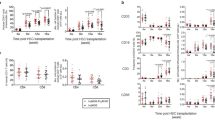Abstract
Recent studies have suggested that Fas ligand (FasL+) tumor cells can induce apoptosis in Fas+ T cells. However, the effect of growth of FasL+ tumors in vivo, on lymphoid tissues of the host is not clear and therefore was the subject of this investigation. Injection of FasL+ LSA tumor caused a significant decrease in cellularity of the thymus and spleen, resulting from marked apoptosis, in syngeneic C57BL/6+/+ (wild-type) but not C57BL/6-lpr/lpr (Fas-deficient) mice. The tumor-induced toxicity resulted from tumor-derived rather than host-derived FasL, inasmuch as LSA tumor growth in C57BL/6-gld/gld (FasL-defective) mice, induced marked apoptosis and toxicity in the thymus and spleen. The LSA tumor growth induced a significant decrease in the percentage of CD4+CD8+ T cells in the thymus of C57BL/6+/+ mice and an increase in the percentage of CD4+, CD8+ and CD4−CD8− T cells. Of the four subpopulations tested, the CD4+CD8+ T cells showed maximum apoptosis. The LSA (FasL+) but not P815(FasL−) tumor cell lysates and culture supernatants induced marked apoptosis in Fas+ thymocytes, when tested both in vitro and in vivo. The LSA-tumor-induced apoptosis in vitro was inhibited by antibodies against FasL or by caspase and other inhibitors of apoptosis. Chemotherapy of LSA-tumor-bearing C57BL/6+/+ mice at advanced stages of tumor growth failed to cure the mice, whereas, more than 80% of LSA-tumor-bearing C57BL/6-lpr/lpr mice, similarly treated, survived. Together, the current study demonstrates that FasL produced by LSA tumor cells is functional in vivo and can cause severe toxicity in lymphoid organs of the host. Also, Fas/FasL interactions may play an important role in the successful chemotherapy of FasL-bearing tumor.
Similar content being viewed by others
Author information
Authors and Affiliations
Additional information
Received: 31 August 1999 / Accepted: 12 November 1999
Rights and permissions
About this article
Cite this article
Nagarkatti, N. Tumor-derived Fas ligand induces toxicity in lymphoid organs and plays an important role in successful chemotherapy. Cancer Immunol Immunother 49, 46–55 (2000). https://doi.org/10.1007/s002620050025
Issue Date:
DOI: https://doi.org/10.1007/s002620050025




